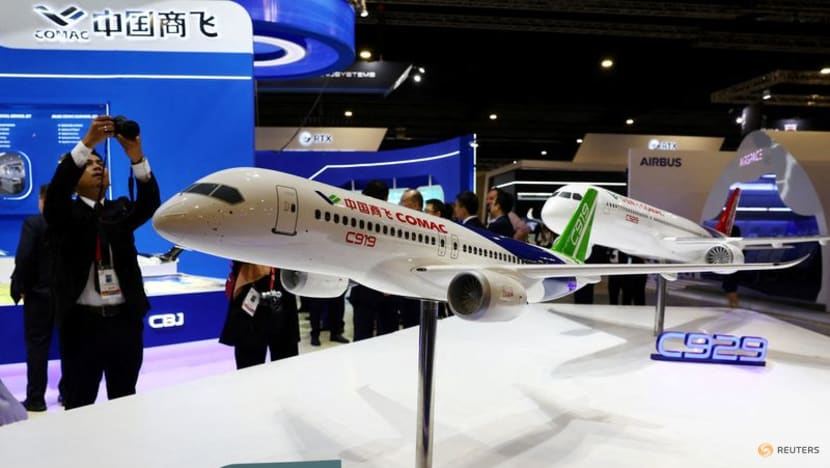‘Competition makes all of us better’: Airbus regional president welcomes Chinese competition in aviation manufacturing sector
Airbus Asia-Pacific’s president Anand Stanley spoke to CNA at the ongoing Singapore Airshow 2024, where Chinese state-owned firm Commercial Aircraft Corporation of China’s C919 airliner is making its international debut.


This audio is generated by an AI tool.
SINGAPORE: Competition in the aviation manufacturing sector benefits all players and should be welcomed, said Airbus Asia-Pacific’s president Anand Stanley on Friday (Feb 23).
Speaking to CNA at the ongoing Singapore Airshow 2024 at the Changi Exhibition Centre, Mr Anand acknowledged the presence of Chinese state-owned firm Commercial Aircraft Corporation of China (COMAC) at the event.
“I'm delighted that they are here, and I welcome that because we welcome competition. Competition makes all of us better,” he said.
COMAC’s narrow-body C919 airliner is making its international debut at the Singapore Airshow.
It had conducted its inaugural commercial trip in May last year, a domestic flight operated by China Eastern Airlines between Shanghai and Beijing.
China’s first domestically developed passenger jet, the C919, is positioned as an alternative to Airbus and Boeing passenger jets, with both aviation giants struggling to meet demand for new planes, and the latter grappling with a string of safety issues.
ASIA PACIFIC LARGEST AVIATION MARKET
Global air travel is expected to finally exceed pre-COVID levels this year, with a full recovery anticipated for the Asia Pacific, according to observers.
Mr Stanley noted that the Asia-Pacific region is the fastest growing market, and also the largest market, in aviation.
“We are talking about 19,000 to 20,000 aircraft over the next 20 years, so it is (an) unstoppable demand to be honest,” he said.
The demand for aircraft has been going up post-pandemic, said Mr Stanley.
“We are looking at 19,000 new aircraft that are required, which shows that air travel is back,” he said.
“Last year, we had a record year in terms of our backlog and orders. We have 8,300 aircraft in the backlog right now.”
Aircraft manufacturers such as Airbus were plagued with problems during the COVID-19 pandemic, including supply chain issues and manpower shortages.
To deliver the aircraft to clients, Airbus is increasing its production capabilities, said Mr Stanley.
The first produced 735 aircraft last year, and is planning on “significantly going beyond that” this year.
“As we are in a ramp-up to meet demand, the supply chain also needs to ramp up to meet the demand,” noted Mr Stanley, adding that the firm is working directly and closely with suppliers to meet the orders.
SUSTAINABILITY FOCUS
Airbus aims to produce the world’s first hydrogen-powered commercial aircraft by 2035.
“We are fully committed to bringing a hydrogen-fueled aircraft by 2035. It's coming along very well. We are doing a lot of work on it year over year,” said Mr Stanley.
“We are looking at multiple different prototypes and vectors for that aircraft, whether it is combustion, which means we burn the hydrogen, or it's fuel cell based.”
On Tuesday, the firm also signed a Memorandum of Understanding (MOU) with the Singapore Economic Development Board (EDB) to set up a Sustainable Aviation Hub in the country.
The facility will bring together aerospace professionals and researchers to focus on technology, research and innovation, in areas such as decarbonisation, maintenance services and air traffic management.
One area of research would be on sustainable aviation fuel and increasing its availability, while another would be on aviation regulation and how to achieve the optimum levels of regulation, said Mr Stanley.
He added that new generation wide-body aircraft being produced by Airbus are more sustainable, and among the most fuel-efficient aircraft around.
“They save about 25 per cent to 40 per cent of fuel compared to the previous generations,” he explained.














